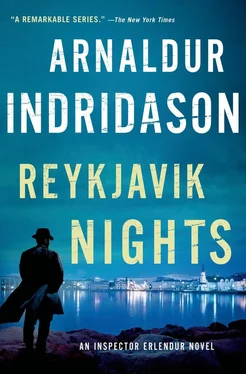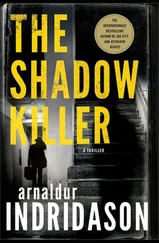‘He’s one of those dickheads who walks in here and thinks he owns the place,’ said the head doorman. ‘It’ll be good to get rid of the prick. He’s barred from now on.’
Marteinn clicked a pair of handcuffs onto the man’s wrists and, with Erlendur’s help, hauled him to his feet.
‘I’m going to sue those bastards for assault!’ the man stormed. His stretch on the kitchen floor had only made him feel more aggrieved. ‘They attacked me. Dragged me in here. Threw me on the floor. I’m going to sue them.’
‘It’s touch and go whether they’ll be able to save Kiddi’s eye — he’s our bartender,’ the bouncer told them. ‘He’ll definitely want to press charges against this tosser.’
Accompanied by a tirade of abuse, they escorted the man outside, through the crowd to the police car. A few of the people in the queue tried to interfere, mouthing off about stupid pigs and police oppression. Inured to such insults, they paid no attention.
Afterwards they took a coffee break at the station. The shift had been no better or worse than usual so far. Car crashes, drunk drivers, bar brawls — it was all part of the job, like the insults of the onlookers.
Much to Erlendur’s irritation, Gardar and Marteinn had spent most of the night arguing about the British rock group Slade. They had heard on the news that there was a chance the band might perform live at the Laugardalshöll concert hall that autumn. Gardar was desperate for tickets. Earlier that summer Procol Harum, one of Marteinn’s favourite groups, had played at the University Cinema. He had attended the first of their three gigs and was so blown away that he had been lost for words. He had been humming ‘A Whiter Shade of Pale’ almost non-stop ever since. But his enthusiasm had fallen on deaf ears, so now when Gardar started going on about Slade, Marteinn was inclined to be scathing.
‘Of course, Slade’s by far and away the coolest band around,’ said Gardar, biting into a kleina, or doughnut twist.
‘Glam-rock rubbish,’ sneered Marteinn. ‘They won’t last — you won’t even remember their name in a few years. Why don’t you listen to Procol Harum or something halfway decent like the Stones? They’re a serious band. I bet they’ll still be rocking when they’re fifty!’
‘Nah, Slade’s the business, man.’
‘Isn’t Pelican doing the same kind of thing?’ asked Erlendur, who took little interest in the music scene but recalled seeing an article in the paper.
‘Well, of course, they’re way cooler,’ said Marteinn. ‘“Jenny Darling” is pure genius.’
They ended their shift down by the harbour, not far from the slipway, where a man had fallen in the sea. He had been saved in the nick of time by a passer-by who had jumped in after him, and he had now been taken to hospital. His rescuer made light of his own condition as he sat in the police van, soaked to the skin, wrapped in a couple of blankets. He was able to give a clear account of the incident and was far more concerned for the man he had fished out of the harbour than for himself.
‘What’ll happen to him?’ he asked.
‘I expect they’ll send him home after a check-up,’ said Erlendur.
‘He’s in a bad way.’
‘Don’t worry, they’ll take a look at him.’
‘No, I mean mentally. They’d better keep an eye on him.’
‘What do you mean?’
‘He didn’t fall.’
‘Oh?’
‘No, it wasn’t like that. He did it on purpose. He jumped.’
‘Are you sure?’
‘Sure! He was fighting me the whole time, begging me to let him go. Pleading with me to leave him to die.’
During their rare encounters Hannibal hadn’t mentioned any relatives, and when Erlendur started asking around about the tramp, he learned that Hannibal never used to talk about his family or his former life. If anyone tried to draw him out he would get angry and accuse them of interfering.
Erlendur discovered in a roundabout way that Hannibal’s sister was a married mother of three. She had gone back to work once her children had left home and was now a doctor’s receptionist in Reykjavík. There was a brother too who was a building contractor up north in Akureyri, married, with no children. Both were sober, respectable citizens, from what Erlendur could ascertain; in fact the brother was an active member of his local temperance movement, perhaps in an attempt to compensate for Hannibal’s lifestyle.
After giving it some thought, Erlendur decided to try to find out more about Hannibal’s background from his sister. He rang the surgery, was put through, and, having introduced himself as an acquaintance of her brother’s, asked if he could have a word.
‘What about?’ she asked. He could hear a phone ringing in the background. Reception was obviously busy.
‘Your brother Hannibal.’
‘What about him?’
‘I—’
‘Why do you want to discuss him?’ She sounded a little flustered. ‘Why are you asking me about Hannibal?’
‘I knew him slightly. Perhaps I could explain better if you’d spare a minute to meet me.’
‘No, you know what, I really don’t have time.’
‘I’d be grateful if—’
‘Look, I’m afraid I don’t have time, I’ve got to take this call.’
‘But—’
‘Sorry, but I’ll have to hang up now. Thank you, goodbye.’
She cut him off.
Erlendur was surprised at this reaction but on reflection he guessed that she had taken him for one of her brother’s homeless friends and wanted nothing to do with him. Perhaps he should have been more specific, explained who he was and the nature of his business, put more pressure on her to meet him. It dawned on him that he didn’t actually know what his business was, or why he had this urge to learn Hannibal’s backstory.
Why was he fixated on the fate of some poor tramp, whom he had, let’s face it, only met a handful of times? Was it because he had been first on the scene and personally fished him out of the water that the image was etched on his brain? He had been shocked when he saw who it was, but he shouldn’t have been all that surprised to come across Hannibal’s body. It was bound to happen sooner or later. The man was in poor shape; after all, he had been living rough, in desperate straits, for years. And his mental state had not been much better. The last time they met, in a cell at the station, Hannibal had spoken of his misery and how he lacked the guts to end to it all.
Was it guilt pushing Erlendur to unearth everything he could about the man? Could he have done more for him, despite Hannibal’s rejection of any help or sympathy? No one cared if a vagrant, who was on his last legs anyway, wound up dead. It just meant one less bum on the streets. No one else was asking questions about this man who had drowned like a stray dog. Even the tramp at the Fever Hospital, who had seemed sure that Hannibal’s death was no accident, had been fairly flippant about his death.
Or could it be that Hannibal had touched a nerve when he exploded, accusing Erlendur of interfering, and demanded to know why he wouldn’t leave him alone?
Whatever it was, something about Hannibal’s sad story had captured Erlendur’s imagination. His fate, yes, but also his dogged determination to withdraw from human society. Where had this need come from? What had caused it? Erlendur sympathised with his loneliness and mental anguish, and yet there was some element of his character — the uncompromising fact of his existence — that was also strangely alluring. The way he had set himself against life and stood, alone and untouchable, beyond all help.
Still lost in this reverie, Erlendur found himself at the doctor’s surgery. It was nearly closing time and there were no more patients in the waiting room. A woman of about forty, with backcombed blonde hair, dressed in a green blouse, a tight skirt and a pretty pearl necklace, was tidying up in reception.
Читать дальше












